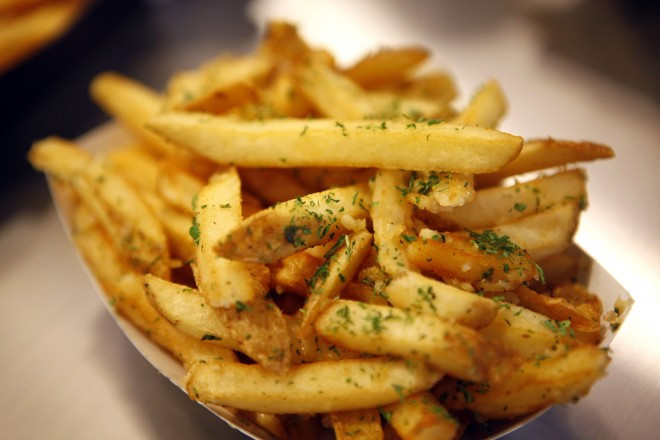High salt intake with fatty diet helps lessen weight gain

Large intake of salt with a high-fat diet has been seen to prevent weight gain in mice, suggesting that health efforts to lower sodium intake may have unexpected consequences.
The University of Iowa scientists, who were stumped by the findings, however caution against consuming high-levels of salt associated with cardiovascular diseases.
The findings point to the effect non-caloric dietary nutrients can have on energy balance and weight gain, they stress.
"People focus on how much fat or sugar is in the food they eat, but [in our experiments] something that has nothing to do with caloric content -- sodium -- has an even bigger effect on weight gain," says Justin Grobe, PhD, assistant professor of pharmacology at the UI Carver College of Medicine and co-senior author of the study.
The team was able to trace the reduced efficiency of the digestive system to extract calories from food to the action of salt on an enzyme in a hormone system commonly targeted in cardio-vascular diseases.
New obesity treatments
Modulating the renin-angiotensin system reduces digestive efficiency, besides cardiovascular diseases, and could pave the way for new anti-obesity treatments.
The study has been published in the journal Scientific Reports.
Starting on the common notion that fat and salt would act together to increase food consumption and promote weight gain, the team fed groups of mice different diets: normal chow or high-fat chow with varying levels of salt (0.25 to 4%).
To their surprise, the mice on the high-fat diet with the lowest salt gained almost three times the weight as the other two groups.
"We found out that our 'french fry' hypothesis was perfectly wrong," says Grobe, who also is a member of the Fraternal Order of Eagles Diabetes Research Center at the UI and a Fellow of the American Heart Association.
The researchers examined four key factors that influence energy balance in animals to understand the puzzling results.
Digestive efficiency lowered
Changes in feeding behavior were ruled out as all the mice ate the same amount of calories regardless of the salt content in their diet.
Even on the energy output there was no difference in resting metabolism or physical activity between the mice on different diets.
This suggested that varying levels of salt had significant effect on digestive efficiency -- the amount of fat from the diet that is absorbed by the body.
"Our study shows that not all calories are created equal," says Michael Lutter, MD, PhD, co-senior study author and UI assistant professor of psychiatry. "Our findings, in conjunction with other studies, are showing that there is a wide range of dietary efficiency, or absorption of calories, in the populations, and that may contribute to resistance or sensitivity to weight gain."
"This suppression of weight gain with increased sodium was due entirely to a reduced efficiency of the digestive tract to extract calories from the food that was consumed," explains Grobe.
Salt levels affect the activity of an enzyme called renin, which is a component in the renin- angiotensin system, a hormone system commonly targeted in various cardiovascular treatments.
The enzyme mediates the control of digestive efficiency by dietary sodium.
Scientists should now analyze diets that are more complex than those currently used in animal experiments and more accurately reflect normal eating behaviour, say experts.
© Copyright IBTimes 2025. All rights reserved.




















